Enabling children to cope with pandemic anxiety
The unprecedented Covid-19 pandemic in the new age of 24×7 television and social media is causing huge emotional stress and anxiety within children and adolescents struggling to cope with parental job losses, deaths of family members, education disruption and forced home confinement
AURELIN RUTH J, MINI P. & CYNTHIA JOHN

In its second wave, the mutant Covid-19 pandemic is raining death and misery countrywide — 362,000 infections and 4,120 fatalities per day (May 13) — the highest worldwide in the history of the pandemic.
In the new world of instant connectivity and audiovisual information explosion and sharing, these are not merely grim statistics. Newspapers, television, Facebook, Twitter, WhatsApp, and other social media are flooded with videos of people literally gasping for breath outside overcrowded hospitals; desperate citizens lining up for admission into hospitals and oxygen cylinders; mass funeral pyres and exhausted doctors and nurses rushing about for medicine, ventilators and life-saving equipment. These distressing scenes are being played out every day countrywide, even as the State seems to have melted away.
This unprecedented pandemic in the new age of 24×7 television and social media is causing huge emotional stress and anxiety within children and adolescents struggling to cope with parental job losses, deaths of family members, education disruption and forced home confinement.
“The outbreak of the Covid-19 pandemic has had a profound impact on the health and psycho-social wellbeing of children in India. Mental health and well-being of children is of serious concern, especially in the context of the pandemic-induced stress they have been experiencing. Psycho-social support from teachers, parents and caregivers is a priority. Supportive structures and actions which help children and caregivers manage stress, fear and anxiety need to be strengthened,” says Psychosocial Support for Children during Covid-19 — A Manual for Parents and Caregivers, released by Unicef and Childline India in early March.
“The signs that children will bear the scars of the pandemic for years to come are unmistakable,” says Henrietta Fore, executive director of Unicef.
 Signs of this disaster warning are already beginning to manifest. Child psychologists and health experts in India are confirming increasing incidence of mental health problems such as anxiety, stress, depression, pandemic fatigue, as well as morbidities such as obesity and diabetes in children and teens. “There’s a steady increase in cases of children suffering anxiety and depression because of the pandemic and lockdown. Anxiety, fear, depression, loss of appetite and insomnia are generating acute anxiety and PTSD (posttraumatic stress disorder) among children. Parents should closely monitor children’s behaviour during this unprecedented time and seek immediate professional aid and counselling to prevent deepening of mental health problems,” says Dr Anju Soni, psychologist and mental health counsellor, Chennai National Hospital. According to Soni, symptoms for parents to watch out for are irritability, anger outbursts, demotivation, suspicious head and/or stomach pain, moodiness, sleep disorders, disinterest in school activities and withdrawn behaviour.
Signs of this disaster warning are already beginning to manifest. Child psychologists and health experts in India are confirming increasing incidence of mental health problems such as anxiety, stress, depression, pandemic fatigue, as well as morbidities such as obesity and diabetes in children and teens. “There’s a steady increase in cases of children suffering anxiety and depression because of the pandemic and lockdown. Anxiety, fear, depression, loss of appetite and insomnia are generating acute anxiety and PTSD (posttraumatic stress disorder) among children. Parents should closely monitor children’s behaviour during this unprecedented time and seek immediate professional aid and counselling to prevent deepening of mental health problems,” says Dr Anju Soni, psychologist and mental health counsellor, Chennai National Hospital. According to Soni, symptoms for parents to watch out for are irritability, anger outbursts, demotivation, suspicious head and/or stomach pain, moodiness, sleep disorders, disinterest in school activities and withdrawn behaviour.
Vaishnavi Murugan, a Chennai-based IT professional and mother of a six-year-old girl child, confirms first-hand experience of pandemic anxiety in children. “My six-year-old daughter Brinda was a calm and happy child before the pandemic lockdown. She loved to read, colour and play with her toys. But five months into the lockdown, she became unusually quiet, irritable, anxious
and refused to attend online classes. She has lost all interest in school activities and even extra-curricular classes and starts throwing temper tantrums and crying when we urge her to engage in school activities,” says Murugan. Following advice from a child counsellor, both parents have been spending quality time with her and engaging in enjoyable activities such as playing her favourite game or walking in the park.
Bengaluru-based Ritesh Bangalani reports that his eight-year-old son keeps smelling things all day to ensure he hasn’t lost his sense of smell — a well-publicised symptom of Covid-19. “If he experiences heat (it’s summer), he asks us to take his temperature. If his legs are sore from running, he enquires if it’s a Covid symptom,” tweeted Bangalani. This tweet received huge response from hundreds of parents countrywide who tweeted similar stories of youngest children disturbed and unsettled by the pandemic.
Even as parents of young children are reporting disorders ranging from temper tantrums to obsessive compulsive behaviour, parents of teenage children are reporting an increase in smart phone and digital addiction. “My ten-year-old son has become obsessively addicted to his
smart phone. If we ask him not to use it, he becomes angry and yells at us. Every night after 10 p.m, he starts playing online games with his friends, and this goes on late into the night. It has severely disturbed his sleeping habits. He is also over-burdened with school work which is stressing him out,” laments Sheila Shetty, a Mangaluru-based homemaker.
Even as children are experiencing a rising tide of anxiety and stress disorders, pandemic fatigue has afflicted adults and children, arousing fears of Covid-inappropriate behaviour. The World Health Organisation (WHO) defines “pandemic fatigue” as “feeling demotivated about following recommended behaviour to protect ourselves and others from the virus”.
A recent survey published in the US-based Journal of the American Medical Association indicates that between April-November 2020, there was a 60 percent drop in the number of people adhering to Covid safety norms. In India as well, pandemic fatigue is prompting parents and children to neglect and abandon standard mask-wearing, hand-washing and social distancing practices.
“With the second wave of the pandemic having hit teens and young adults hard, parents need to reinforce Covid-appropriate behaviour among children and teenagers,” warns Dr. Anju Soni.
Undoubtedly, the constantly mutating Coronavirus has provoked unprecedented anxiety and fear within children about the well-being of parents and loved ones. It has also for the first time in a century forced naturally active children and gregarious youth to remain cabined, cribbed and confined in cramped flats and nuclear homes.

Comments Rajat Soni, a New Delhi-based teen, life and parenting coach: “The pandemic, especially in its second wave, has severely disrupted the mental health of teenagers. I have witnessed numerous adolescents suffering depression, disinterested in any hobbies or activity and suffused with negativity. Physically active teenagers are not used to being confined to their homes under 24/7 parental supervision and control. It causes intense irritation and anxiety within adolescents who tend to vent their frustration by way of anger outbursts and/or retreat into depression.”
Soni recommends a four-step CARE approach for parents to enable adolescents to cope with depression.
- Constant communication. Continuous communication with teenage children, monitoring their behaviour, diet and sleep changes is critically important.
Persistent behaviour changes need to be reported to a
child counselor. - Affirmation and gratitude ritual. Parents should role model teenagers and children to practice positive affirmation and expression of gratitude. Affirmations are positive statements that make children feel appreciated and valued. When a child repeats such behaviour, she experiences the sunny side of life. Some useful affirmations: ‘I am calm and relaxed’; ‘I am attracting positive energy into my body’; ‘I am safe and in control’; and ‘I am strong and will recover soon’.
- Refrain from over-using social media. Restrict children to accessing social media to prevent them from acquiring negative information about the pandemic. It exacerbates children’s anxiety and stress.
- EFT (Emotional Freedom Technique). This technique/therapy involves tapping specific energy meridian points of the body, in a particular sequence to release anxiety and stress. For further information visit https://www.medicalnewstoday.com/ articles/326434#how-to-do-eft-tapping.
The mental and emotional problems of children and teens are compounded by a heavy toll on children’s physical health and wellness. Sharp reduction in all physical activity — games, sports, athletics — has prompted the outbreak of lifestyle diseases such as diabetes, vision loss, precocious puberty and irregular menstrual cycles within girl children.
“There’s been a sharp increase in cases of precocious puberty, i.e, commencement of menstruation before age eight among girl children. Moreover, adolescent girls are experiencing irregular menstrual cycles and hormonal imbalances. This is the outcome of reduced physical activity and increased intake of unhealthy packaged foods. All this has led to a rising wave of child obesity,” warns Dr. Vasanthi Venkatesh, gynaecologist at the Shraddha Clinic, Bengaluru.
Shalika Sharma, a Pune-based homemaker, cites the experience of her teenage daughter who has begun frequent snacking on junk foods while cutting out all physical exercise. “My 13-year-old daughter was a healthy, cheerful child before these on and off lockdowns began. Now after 15 months at home under the lockdown, her entire diet and eating routine has changed.
What began as small-time snacking out of sheer boredom has now turned into full-time binge eating. She has become obese and developed juvenile diabetes with a blood sugar count of 540. She has been officially diagnosed with metabolic syndrome. Study from home and restricted living has made the life of adolescents miserable,” says Sharma, whose daughter is currently undergoing medical treatment.
Although the year-long shutdown of all schools and education institutions countrywide has taken a heavy toll on children’s mental health and well-being, some children have devised imaginative responses to pandemic challenges. Indeed, some can-do teens have transformed the threat posed by the dreaded virus to mental and physical well-being into self-improvement opportunities. A substantial number are learning yoga, ingenious new fitness regimes, learning cooking, musical instruments and social welfare project management that will stand them in good stead in the post-pandemic era.
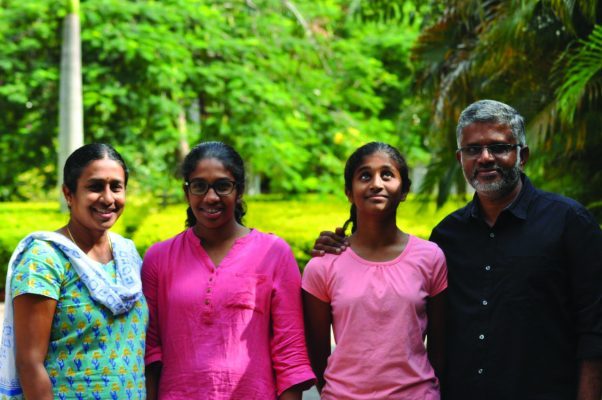
For instance, Coimbatore-based teenager sisters Shreya and Shanavi Santhanam, who are school swimming champs, converted a water-well on their farm into a practice pool. “Initially staying home was depressing. But since we live on a farm, we were able to convert a 20 ft long rectangular waterwell into a practice pool. Now we swim every day for two hours after online school to improve
our timings. I also signed up for online art classes,” says Shreya (16), winner of a bronze medal in 50m freestyle and gold in the 100m relay of the ASISE Regional Aquatic Meet 2019.

Likewise, Adriel Joshua (16), a class XII student of Don Bosco School in Chennai, has grasped the opportunity to improve his people management and communication skills. “We have weekly Zoom chat sessions with friends – a special time during which we discuss socio-economic issues,
play games, motivate and even counsel each other. The pandemic lockdown has enabled me to bond with my friends,” says Joshua.
Helping children cope with PANDEMIC ANXIETY
With India reporting a massive 4.01 lakh Covid-19 positive cases and 4,197 fatalities per day (May
7), it’s inevitable for children to hear news of severely ill family, friends and relatives or deceased. Young children are not emotionally equipped to cope with severe shock and loss.
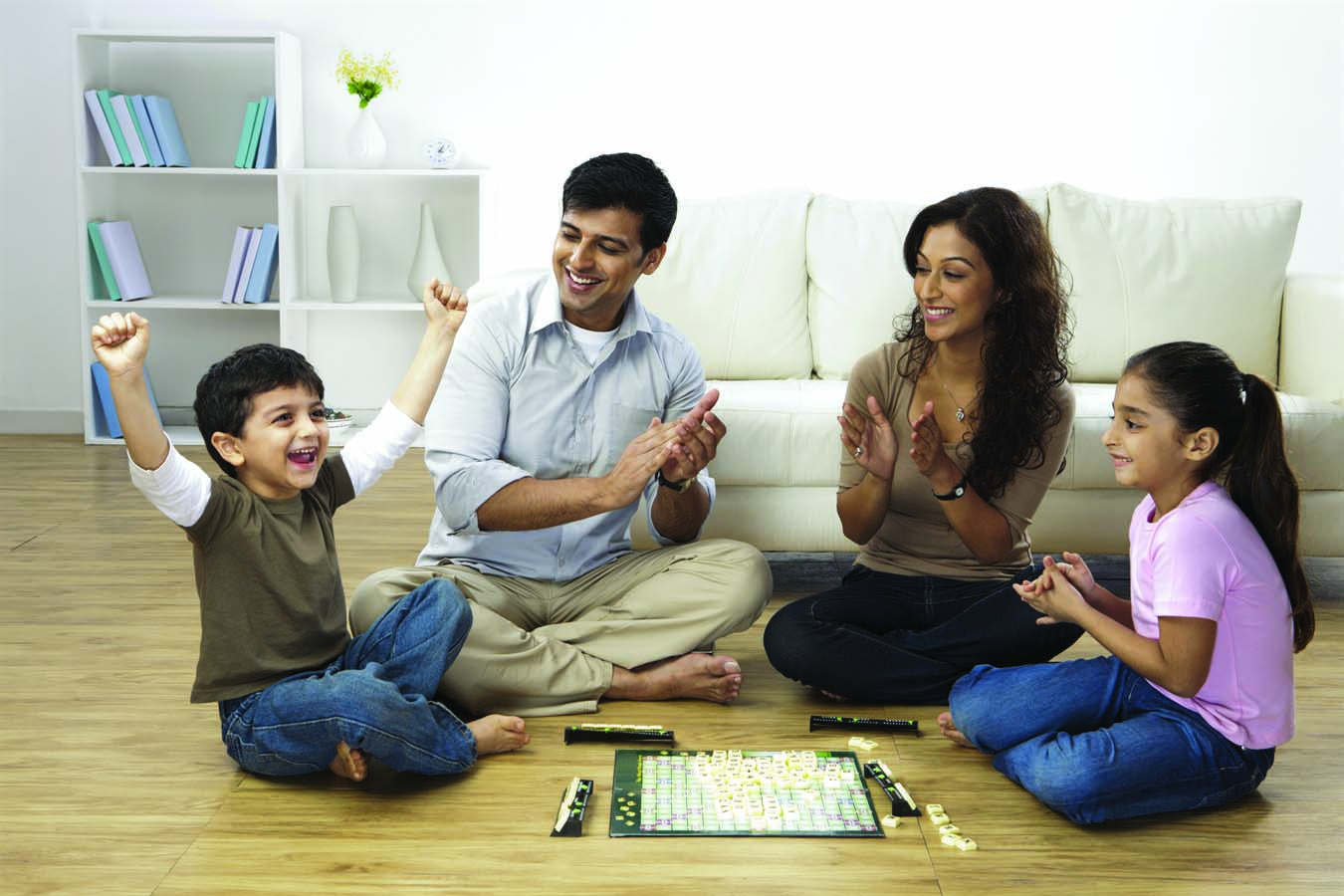
Fear of losing their parents and grandparents suddenly becomes very real for them. Such apprehension combined with masking, social distancing and lockdown rules can drive children into deep anxiety and depression. Dr. Anju Soni, psychologist
and mental health counsellor at the Chennai National Hospital, suggests ways and means for parents to protect and enable children to cope with pandemic anxiety:
- Avoid discussing stressful subjects such as deaths and hospitalisation of close relatives, family, and colleagues before children.
- Restrict access to Covid-19 related content on TV/ social media.
- Prepare children to cope with family emergencies such as sickness or death by providing real-time information.
- It’s important to be honest with children. Don’t make false promises such as “Don’t worry; no one in our family is going to catch the virus.”
- Offer children emotional comfort, hope and your unconditional love when they are depressed and anxious.
- Maintain a balance between children’s online classes and offline activities. Encourage them to learn a musical instrument, paint and read.
- Monitor your child’s online activities by using parental controls available in all digital devices. Set time limits for digital media browsing.
- Role model an hour of moderate to intense physical activity and exercise.
- Promote family bonding by playing board games, chess etc together.
- Don’t transfer your anxieties and frustrations to children.
- Provide a nutritious, fibre-rich diet with minimal junk food intake.
Pandemic coping strategies for PARENTS
PW spoke with several knowledgeable health and parenting experts to compile a guide for parents to enable them to cope with pandemic and lockdown anxiety.

- Go to sleep and wake up at the same time every day. Take short naps duri ng the day if you are short on sleep. Adhering to a regular sleep routine lowers stress and energises body and mind.
- Adopt healthy self-care strategies — prepare vegetables-rich meals, exercise, remain connected with friends.
- Draw up a daily routine for yourself and the children. Make time for family within this routine.
- Pursue engaging and enjoyable hobbies and activities.
- Set relationship boundaries with your spouse and children. Re-arrange your home with separate spaces for all family members.
- Communicate openly and honestly with children. Ask, listen and respond to their concerns and fears
- Laughter is the best medicine so don’t forget your sense of humour.
- Engage in positive en famille activities. Emulate families packing home-cooked meals for Corona-hit households.
- Be kind to yourself. Super and perfect parenting is not possible in these unprecedented pandemic times.
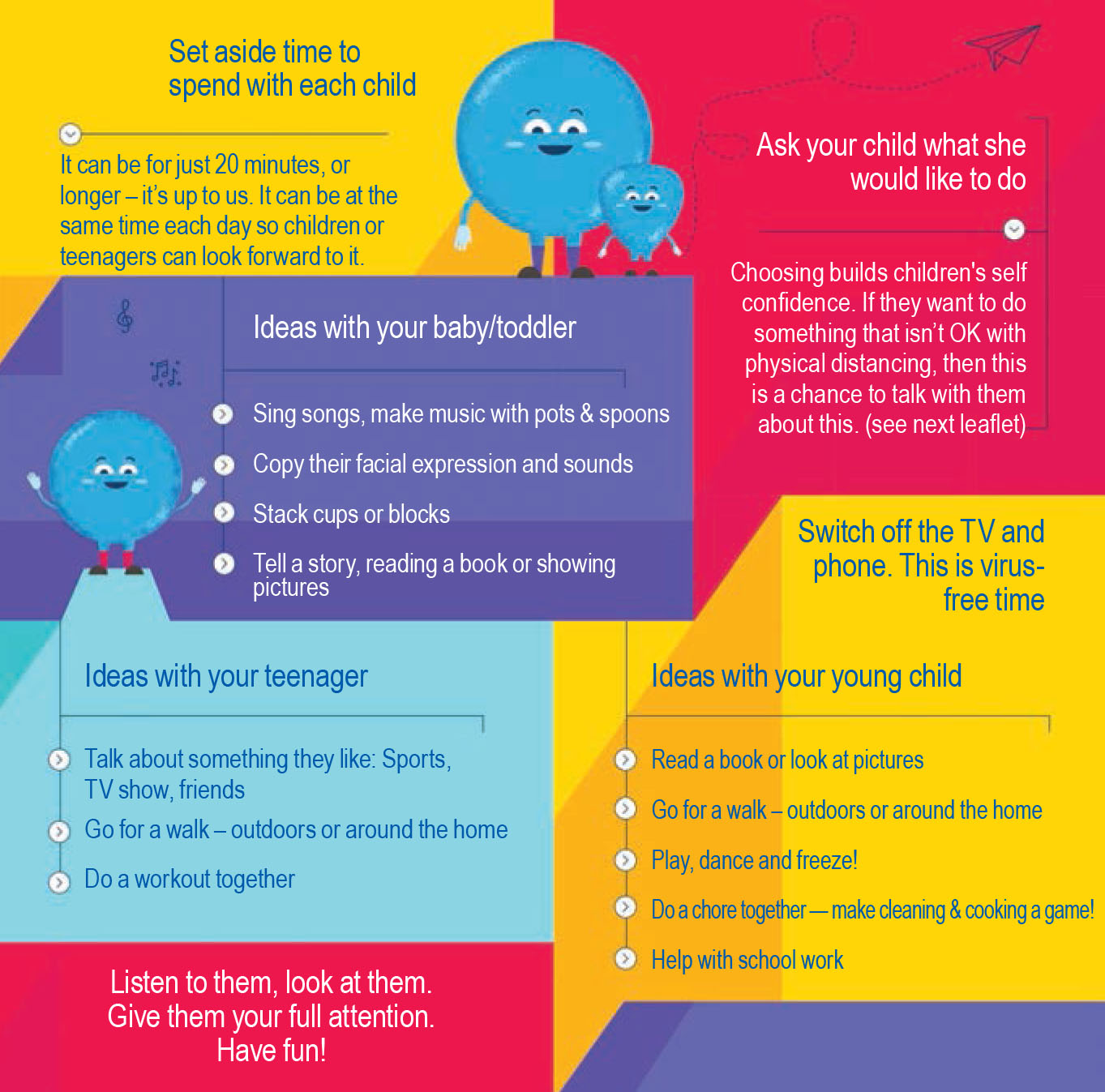
In early March, Unicef and Childline India released Psychosocial Support for Children during Covid-19 — A Manual for Parents and Caregivers. This manual provides excellent information and advice to parents to manage Covid-19 related stress, fear and anxiety within children. Excerpts:
COVID-19 PARENTING: QUALITY TIME
School shutdown is also a chance to strengthen relationships with our children and adolescents. Quality time is free and fun. It makes children feel loved and secure, and shows them that they are important.
COVID-19 PARENTING: KEEPING IT POSITIVE
It’s hard to feel positive when our kids or teenagers are driving us crazy. We often end up saying. “Stop doing that!” But children are much more likely to do what we ask if we give them positive instructions and lots of praise for what they do right.
COVID-19 PARENTING: STRUCTURE UP!
Covid-19 has taken away our daily work, home and school routines. This is hard for children, teenagers and you. Making new routines can help.
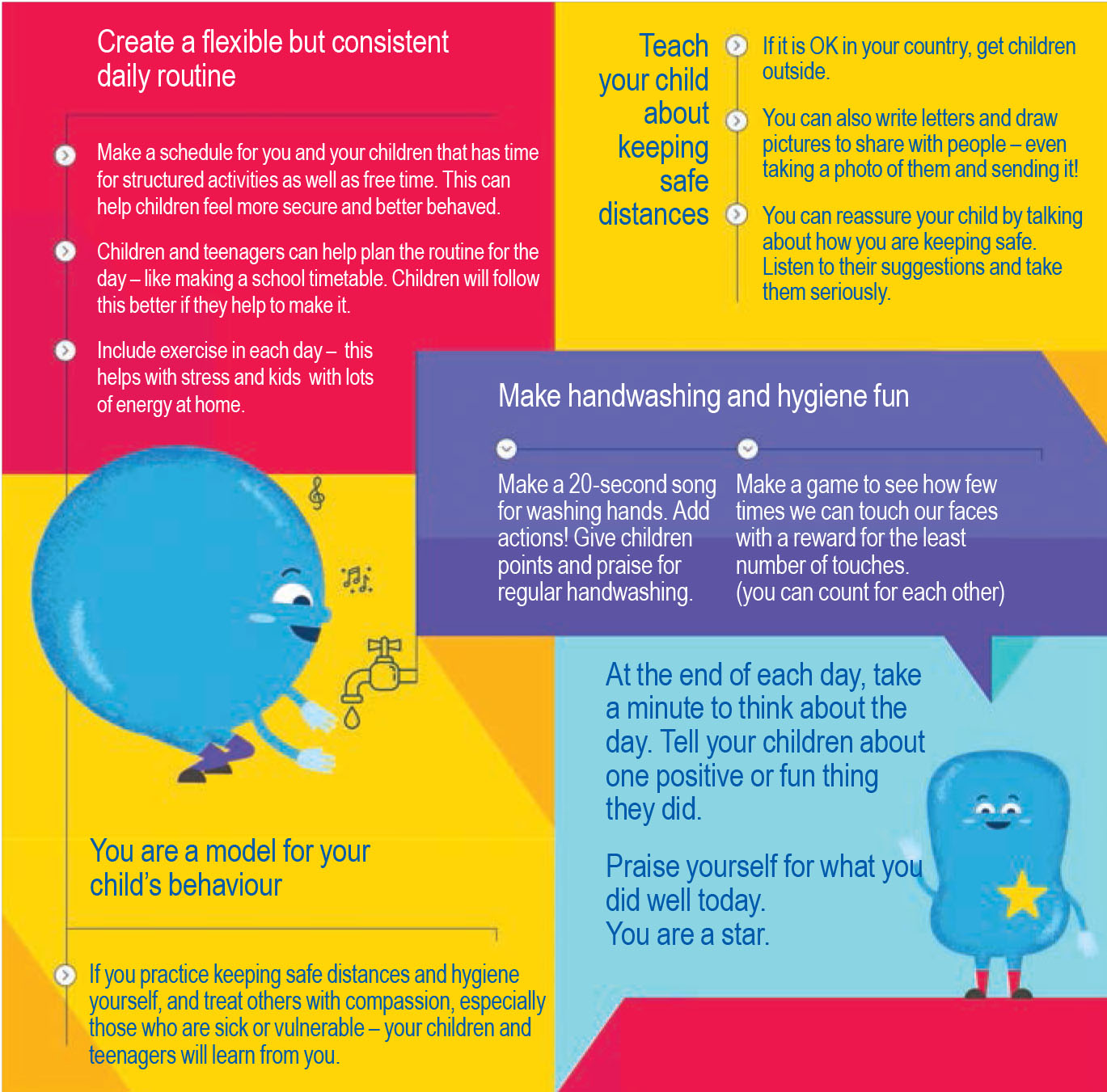
COVID-19 PARENTING: HONESTY & OPENNESS WHEN GIVING INFORMATION
Be willing to talk. They will have already heard something. Silence and secrets don’t protect them. Honesty and openness do. Think about how much they will understand. You know them best!
Source: Psychosocial Support for Children during Covid-19 — A Manual for Parents and Caregivers by Unicef and Childline India
Also Read: Nurturing children’s entrepreneurship skills






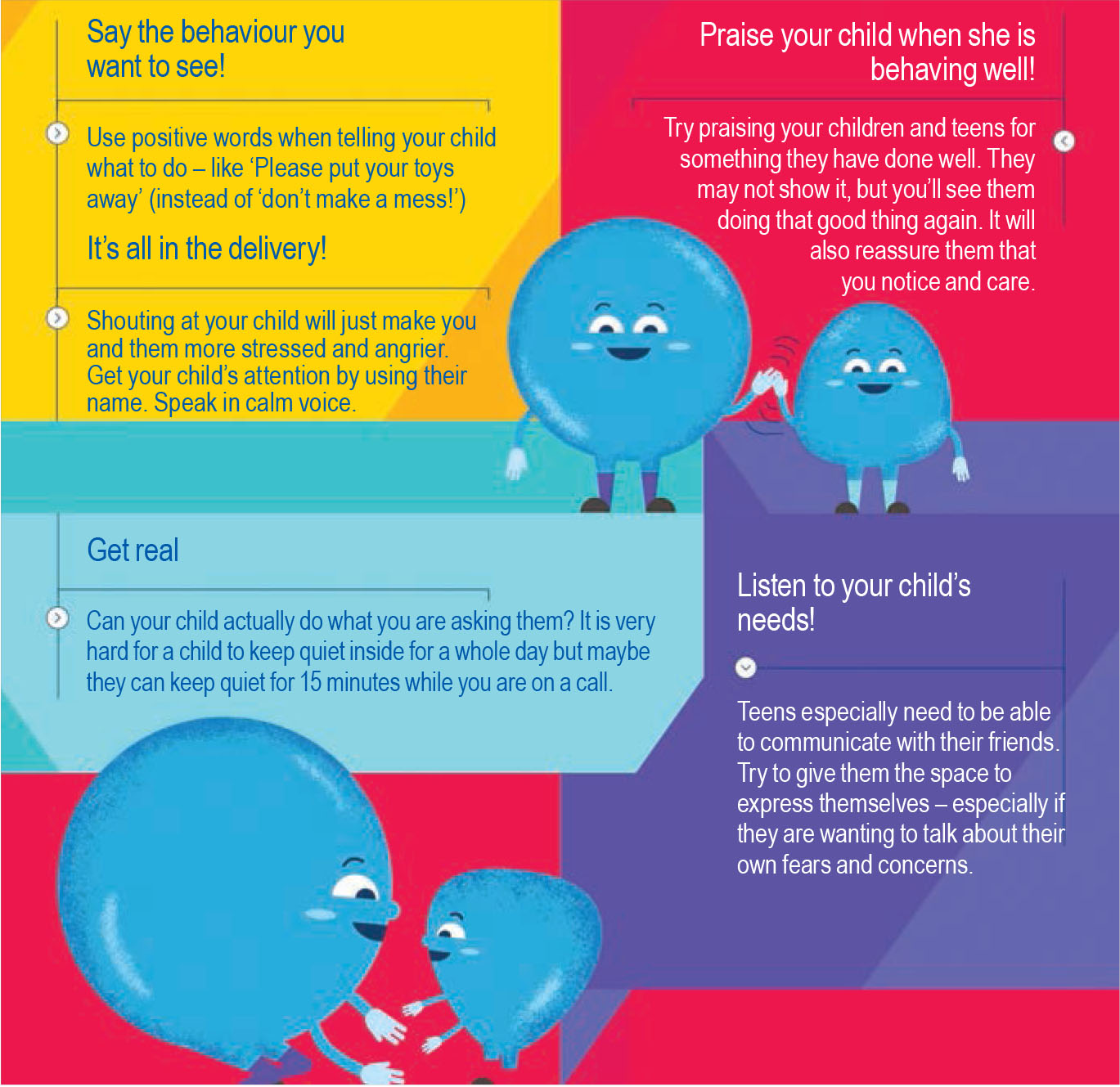











Add comment